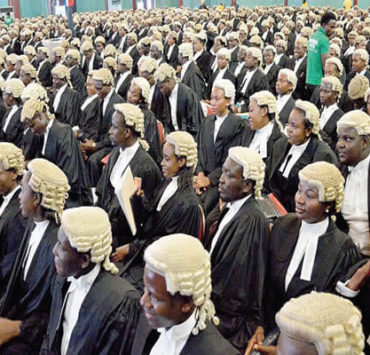Be the First to Know: On Payment of a Councilor from a State’s Consolidated Revenue Fund

TITLE: WHETHER THE SALARY OF A LOCAL GOVERNMENT COUNCILOR CAN BE DETERMINED AND CHARGED UPON THE CONSOLIDATED REVENUE FUND OF A STATE
CASE TITLE: CHARLES NWOKEDI v. ANAMBRA STATE GOVERNMENT & ANOR (2022) LPELR-57033(SC)
JUDGMENT DATE: 4TH FEBRUARY, 2022
JUSTICES: OLUKAYODE ARIWOOLA, JSC
JOHN INYANG OKORO, JSC
AMINA ADAMU AUGIE, JSC
UWANI MUSA ABBA AJI, JSC
ABDU ABOKI, JSC
PRACTICE AREA: Constitutional Law – Constitutional Provision
FACTS:
Charles Nwokedi (Appellant) was a Councilor duly elected in 1999 and he served the 2nd Respondent until the termination of the tenure of his office in May, 2002. In the course of his service as Councilor, controversies arose with respect to the proper remuneration payable to him. Eventually, the Appellant’s remuneration formed the subject matter of a recommendation of the Federal Revenue Mobilization Allocation and Fiscal Commission, which fixed salaries of all Political Office Holders at all levels of Government and sent out circulars to that effect.
Subsequently, the Anambra State Government (1st Respondent), through the Anambra State House of Assembly, passed a law called the Anambra State of Nigeria Public Officers’ Salaries Law No. 7 of 2001, which codified the Circular of the Federal Revenue Mobilization, Allocation and Fiscal Commission. The Appellant, through the umbrella body of the State’s Councilors (i.e., the Anambra State Councilors Forum (ASCOF) made several representations to the Respondents to pay his salary, all to no avail.
As a result, the Appellant took out a Writ of Summons against the Respondents in the trial Court, wherein he sought, inter alia, for all the outstanding monies accrued to him and an order directing the 1st Respondent to pay him the claimed sums from source, out of the State Joint Local Government Account, from the monies due to the Onitsha North Local Government (2nd Respondent) from the said account.
In its considered judgment, the trial Court dismissed the Appellant’s case and held that the Anambra State House of Assembly exceeded her powers when she enacted Law No. 7 of 2001, purporting to have charged salaries and emoluments of Councilors into the Consolidated Revenue Fund of the State.
Dissatisfied, the Appellant appealed to the Court of Appeal.
The Court of Appeal dismissed the appeal, and held that the Appellant should not have been included as one of the beneficiaries of the scheme by either the House of Assembly or the Revenue Mobilization Allocation and Fiscal Commission.
Further dissatisfied, the Appellant appealed to the Supreme Court.
ISSUES FOR DETERMINATION:
The appeal was determined on the following issues:
- Whether the Court of Appeal was correct when they held that Local Government Councilors do not come within the purview of “Political Office Holders” in Section 32(d) Item N, Part I of the Third Schedule to the 1999 Constitution of Nigeria, as amended?
- Whether the Court of Appeal was correct, when they held that the Law No. 7 of 2001 Anambra State Public Officers’ Law, was enacted, ultra vires the Anambra State House of Assembly and is as a result inconsistent with the provisions of the 1999 Constitution of Nigeria, as amended, if yes, did the trial Court have the jurisdiction and competence to declare it null and void?
COUNSEL SUBMISSIONS:
Learned Counsel for the Appellant submitted that the Court of Appeal was wrong to have held that Local Government Councilors do not come within the purview of “Political Office Holders” in Section 32(d) Item N, Part I of the Third Schedule to the 1999 Constitution of Nigeria, as amended. That the use of the word “including”, after the words “Political Office Holders” in the section means that all Political Office Holders, outside of those specifically mentioned, are included. That the listing of those officers, cannot be read to exclude other Political Office Holders as any such interpretation will harm the spirit and the letters of the Constitution.
On the other hand, Learned Counsel for the Respondent submitted that it is not within the powers of the Revenue Mobilization, Allocation and Fiscal Commission to determine the remuneration of Local Government Councilors notwithstanding the provisions of Section 6(f) of the Revenue Mobilization, Allocation and Fiscal Commission Act. That a Councilor, though a political office holder, does not come within the purview of those office holders whose salaries shall be determined and charged upon by the Consolidated Revenue Fund. That since Paragraph 32(d) of the Third Schedule to the Constitution has empowered the Commission to determine the remuneration of Political Office holders specifically mentioned or enumerated in that sub-paragraph of the Schedule, Councilors are excluded from the arrangement.
DECISION/HELD:
In the final analysis, the appeal failed and was dismissed.
RATIO:
- CONSTITUTIONAL LAW- CONSTITUTIONAL PROVISION: Whether a Local Government Councilor comes within the purview of political office holders as provided for in the Constitution whose salaries shall be determined and charged upon the Consolidated Revenue Fund of the State by the Revenue Mobilization Allocation and Fiscal Commission
“…Section 6 of the RMAFC Act stipulates the powers of the Commission as regards remuneration…It follows therefore that Section 6(1)(d) of the RMAFC Act makes no mention of a Councilor as one of those Public Officers or Political Office Holders to benefit from payment of salary and emolument from the Consolidated Revenue Fund and whose salary shall be fixed by the Revenue Mobilization Allocation and Fiscal Commission. The argument of learned counsel for the Appellant is that the scope of political office Holders, whose names were not mentioned, have been expanded vide Section 6(1)(f) of the RMAFC Act which provides that the Commission shall have power to – “(f) discharge such other functions as may be conferred on it (Commission) by the Constitution of the Federal Republic of Nigeria, this Act, or any other Act of the National Assembly.” This stance by learned counsel is with respect, untenable. The simple reason is because those other functions that the Commission ought to perform or upon which extra power may be conferred on it by the Constitution, the Act or any other Act of the National Assembly, do not envisage expanding the scope of Political Office Holders or Public Officers whose names have not been mentioned either by the Constitution, the RMAFC Act itself or any Act of the National Assembly. Assuming (but without conceding) that the scope is to be expanded, in the clear and unambiguous words of Section 6(1)(f) of the RMAFC Act, it is only the RMAFC Act itself; the Constitution or another Act of the National Assembly, that can expand the scope or powers thereof and not an inferior Legislative House like that of Anambra State House of Assembly. I am therefore in total disagreement with the submissions of learned Counsel for the Appellant that the provisions of Section 32(d) Item N, Part 1 of the Third Schedule of 1999 Constitution, as amended, expands the scope of the Commission to include Councilors…The import of Section 32(d) Item N, Part 1 of the Third Schedule of 1999 Constitution, as amended, (which in my view, is an assemblage of Sections 84 and 124 of the Constitution of the Federal Republic of Nigeria, 1999 as amended, as well as Section 6(1)(d) and (f) of the RMAFC Act) is that the inclusion of Local Government Councilors by the Anambra State Law No. 7 of 2001, in the List of Political Office Holders or Public Officers of whom their salaries shall be fixed by the Revenue Mobilization Allocation and Fiscal Commission and charged upon the Consolidated Revenue Fund of Anambra State, is at variance with the express provisions of the 1999 Constitution, as amended…As rightly held by the Court below, it would appear there was a legislative device to deliberately exclude political office holders like Councilors who are legislators as of right on their Local Government tier of Government. However, they are not legislators properly so called as envisaged by the Constitution in Section 318(1) thereof, which states…The Legislative Council of a Local Government is not mentioned by the Constitution so by extension, a Councilor is not recognized by the Constitution as a member of a Legislative House properly so-called. Again, Section 318(1) of the 1999 Constitution, as amended, defined the “Public Service of a State” to mean the service of the State in any capacity in respect of the Government of the State and includes service as mentioned in sub-paragraphs (a) to (g) thereunder. What is more, Section 120 of the CFRN 1999, as amended, which in Subsection (1), established the Consolidated Revenue Fund of the State, stipulates in Subsection (2) thereof, that: “No money shall be withdrawn from the Consolidated Revenue Fund of the State except to meet expenditure that is charged upon the fund by this Constitution, or where the issue of those moneys has been authorized by an Appropriation Law, Supplementary Appropriation Law or Law passed in pursuance of Section 121 of this Constitution.” It follows therefore, that any expenditure that is to be charged upon the fund by this Constitution, SHALL be as stipulated by Section 124(4) of the CFRN 1999, as amended. The consequence of the above is that the inclusion of Chairman of Local Government, Vice Chairman, Secretary to Local Government, Supervisors, Special Advisers/P.A. to the Chairman, leader of the Local Government Legislative Council, Deputy Leader, and Councilors, by the Anambra State Law No. 7 of 2001, in the List of Political Office holders or Public Officers whose salaries shall be fixed by the Revenue Mobilization Allocation and Fiscal Commission and charged upon the Consolidated Revenue Fund of Anambra State, is against the express provisions of Section 124(4) of the 1999 Constitution, as amended.” Per ABOKI, J.S.C,
Lawyard is a legal media and services platform that provides enlightenment and access to legal services to members of the public (individuals and businesses) while also availing lawyers of needed information on new trends and resources in various areas of legal practice.













